Diabetes cannot be cured but it can be managed. Its management becomes difficult when a patient has to monitor it every day by piercing his or her finger to check the blood sugar level. Now an international team of researchers has a self-powered glucose biosensor technology base device that can measure the blood sugar level through saliva samples also. This device can work inside the body without using any external electrical energy.
Continuous monitoring of fluctuating sugar levels in the blood is often required for patients with diabetes. Implantable glucose biosensors could mitigate the painful finger-pricking process. However, the electricity requirement for the implantable glucose-sensing devices is the major challenge, making the implantation a complicated process.
“The team has demonstrated a linear response to glucose at concentrations relevant for non-diabetic and diabetic saliva. The sensor will be useful for the quick, accurate and early detection of abnormalities in metabolism that helps monitor, control and prevent many metabolic disorders, including diabetes” said Dr. P. Tamilarasan, Scientist and research team member, Council of Scientific and Industrial Research – Central Electrochemical Research Institute (CSIR-CERI).
Any implantable electrical or electrochemical device requires electrical energy for its operation. Producing electricity inside the human body is a challenging task. This complete device can function inside the body without an external electricity supply. In this technology, an electron-transporting n-type semiconductor polymer and an enzyme are used to extracts electrons proportional to the glucose level in bodily fluid.
The polymer-based electrode that can be used for glucose sensing as well as electricity generation. On the other hand, an enzymatic fuel cell using the same materials has been developed to generate electricity using the glucose in bodily fluids. Glucose is sensed by a transistor made up of the polymer which is powered by the enzymatic fuel cell made up of the same polymer electrode using glucose as a fuel.
The generated energy is sufficient enough to operate an organic electrochemical transistor type glucose sensor. The enzymatic fuel cell could utilize glucose to power other implantable electronic devices.
Currently, the research team has developed the materials and demonstrated its operation quantitatively and qualitatively. Further studies on device design, biocompatibility, and in-vivo characterizations may lead the technology towards practical application. (ISW)
If you liked this article, then please subscribe to our YouTube Channel for the latest Science & Tech news. You can also find us on Twitter & Facebook.



